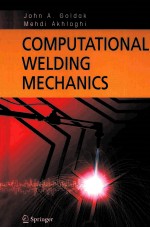

COMPUTATIONAL WELDING MECHANICSPDF电子书下载
- 电子书积分:12 积分如何计算积分?
- 作 者:
- 出 版 社:SPRINGER
- 出版年份:2005
- ISBN:0387232877
- 页数:321 页
Chapter Ⅰ:Introduction 1
1.1 Introduction and Synopsis 1
1.2 Brief history of computational welding mechanics 5
1.3 Mechanical behavior of welds 8
1.4 Major objective of this book 11
1.5 References 11
Chapter Ⅱ:Computer Simulation of Welding Processes 16
2.1 Introduction and Synopsis 16
2.2 The Computing Environment 18
2.2.1 Computational Geometry 18
2.2.2 Models for Welding Heat Sources 22
Theoretical Formulations 22
Model Considerations 24
Gaussian Surface Flux Distribution 26
Hemi-spherical Power Density Distribution 30
Ellipsoidal Power Density Distribution 30
Double Ellipsoidal Power Density Distribution 32
2.2.3 Kinematic Models for Welding Heat Transfer 35
2.2.4 Evaluation of the Double Ellipsoid Model 43
2.2.5 Modeling Thermal Stresses and Distortions in Welds 51
2.2.6 Microstructure Modeling in Heat Affected Zone (HAZ) 59
2.2.7 Spatial Integration Schemes 63
2.3 References 64
Chapter Ⅲ:Thermal Analysis of Welds 71
3.1 Introduction and Synopsis 71
3.2 Heat Transfer Theory 74
3.3 Weld Heat Source 76
3.3.1 Data to characterize a Weld Heat Source 77
3.3.2 Modeling a Weld Heat Source 79
First Generation Weld Heat Source Models 80
Second Generation Weld Heat Source Models 81
Distributed Heat Source Models 83
Prescribed Temperature Heat Source Models 83
Third Generation Weld Heat Source Models 84
Fourth Generation Weld Heat Source Models 85
Fifth Generation Weld Heat Source Model 86
Hierarchical Weld Process Models 87
3.4 Heat Transfer in Welds 87
3.4.1 Power Input 89
3.4.2 Implementation of prescribed temperature model 93
3.4.3 Starting Transient 94
3.4.4 Boundary Conditions 95
3.4.5 Finite Element Solutions with Prescribed Temperature 98
3.4.6 Computational Results 100
Complex Weld Pool Shape 100
Welds with Filler Metal Addition 108
3.5 References 115
Chapter Ⅳ:Evolution of Microstructure Depending On Temperature 119
4.1 Introduction and Synopsis 119
4.2 Microstructure Model 124
4.2.1 Data Structures 131
Flow lines 131
Functionality of the Data Structure 132
Layered tree description 132
Locating elements 135
Creating flow lines 136
4.2.2 Test Problems and Results 138
Steady State Temperature Field 140
Clipped transient temperature field 143
4.3 Hardness Calculation of the HAZ 148
4.4 References 149
Chapter Ⅴ:Evolution of Microstructure Depending On Deformations 153
5.1 Introduction and Synopsis 153
5.2 Properties for Modeling 158
5.2.1 Stresses,Strains and Deformations 162
5.2.2 Rate Independent Isotropic Plasticity 168
Steady-State Formulation 169
Deformation 172
Strain Increment Measurement 174
Numerical Results 176
5.2.3 Linear Viscous Isotropic Plasticity around melting pt 183
5.2.4 Rate dependent isotropic plasticity (General case) 184
5.2.5 Changing Constitutive Equations in Time and Space 185
5.2.6 Numerical Experiments and Results 186
5.3 References 195
Chapter Ⅵ:Carburized and Hydrogen Diffusion Analysis 199
6.1 Introduction and Synopsis 199
6.2 Carburization; Theory and Numerical Methods 203
6.2.1 Thermal,Microstructure and Stress Analysis 210
Thermal Analysis 210
Microstructure Analysis 211
Thermal Stress Analysis 211
Coupling Thermal,Microstructure and Stress Analysis 212
Test 212
Task Sequence 213
Structure and Materials 214
Deposition of Welds 214
FEM Mesh 215
Results and Discussion 217
6.3 Hydrogen Diffusion in Welds 226
6.3.1 Fundamental Equation 228
6.3.2 Preheat prediction 232
6.3.3 Computational Analysis 238
6.4 References 244
Chapter Ⅶ:Welded Structures and Applications of Welding in Industrial Fields 247
7.1 Introduction and Synopsis 247
7.2 Weld Procedure 249
7.3 Weld Joint 251
7.4 Analysis of a Weld Structure 252
7.5 Real-Time for CWM 266
7.5.1 Current Performance for CWM 269
7.5.2 Implications of real-time CWM 271
7.6 References 273
Chapter Ⅷ:Fracture Mechanics 277
8.1 Introduction and Synopsis 277
8.2 Review and Model Development 283
8.3 Discussion 300
8.4 References 302
Chapter Ⅸ:Input Data for Computational Welding Mechanics 305
9.1 Introduction and Synopsis 305
9.2 Structure to be Welded 305
9.3 Weld Procedure 307
9.4 Thermal Analysis Outside the Weld Pool 308
9.5 Microstructure Evolution 308
9.6 Thermal Stress Analysis Outside the Weld Pool 309
9.7 Weld Pool Solver 310
9.8 Material Properties Summary 311
9.9 Visualization 312
9.10 Fracture Mechanics of Welded Structures 312
Index 315
